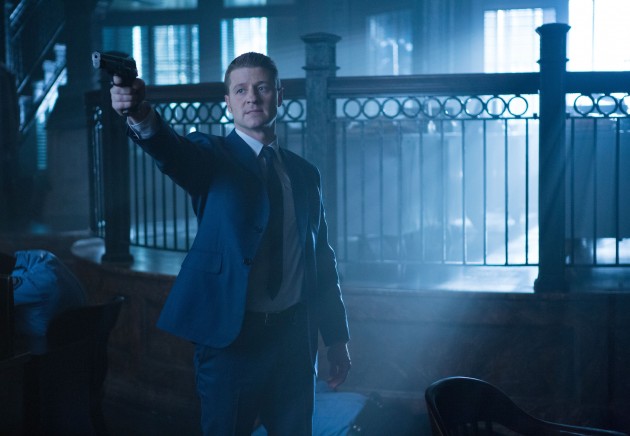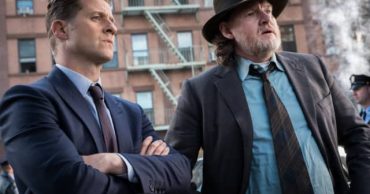
This coming Monday (April 13), FOX’s hit series Gotham returns, continuing to tell the story of the legendary characters in the Batman mythology as we follow the journey of Detective Jim Gordon through the early years of his career and witness the origins of some of the most iconic villains in the DC Universe. This week, TVOvermind joined several other news outlets in a conference call with the future commissioner himself, Ben McKenzie, as he teases what is coming up in the final four episodes of the first season and more.
Be aware of potential spoilers from the conference call which has been edited for time and content.
Although there are many different components to Gotham, the primary focus of the show has been watching Jim Gordon grow as a detective, as his relationship with his partner Harvey Bullock (Donal Logue) has developed over the course of the first season. While people could look at the pair’s partnership in numerous ways, McKenzie has one word that he thinks sums it up.
“I would say, overall, perhaps the best word I can use to describe the evolution of their relationship is maturation,” McKenzie says about Jim and Harvey. “It’s been kind of a maturation process. Initially, Jim and Harvey were polar opposites. Jim is the wet behind the ears, almost naive rookie cop, and Harvey is the jaded, cynical veteran. As the season progresses, they learn from each other. Harvey is inspired a bit by Jim’s do-gooderism, but Jim is also educated in the ways of Gotham and becomes more sophisticated in the ways that he approaches cases and the way that he uses the power that he gains through relationships with, say, Oswald Cobblepot, in order to get what he wants.”
“So, there’s give and take,” McKenzie continues. “The last episode that we saw on screen, Harvey betrayed Jim by testifying against him in the case of Arnold Flass in getting the case dismissed. He did that because Commissioner Loeb had evidence on Harvey, had dirt on him, and so Harvey and Jim team up to find that stash of evidence, only to find out that it’s basically Loeb’s daughter who’s mentally kind of handicapped. Jim then ends up using the existence of that daughter against Loeb to get what he wants. So, you’re seeing a real evolution in Jim’s character that he is not afraid to do something that’s morally or ethically borderline, if not over the line, in order to get what he wants, get what he needs for the greater good. He’s doing it in part for Harvey, and he gives Harvey back the dirt, so Harvey is in the clear, but they’re at a détente as we leave the last episode. They’re–yes, détente might be the best word.”
But is Jim really aware that he’s close to crossing a line?
“I think he’s being sucked in.” says McKenzie. “I think he is aware on some level. But I think the overwhelming nature of Gotham tends to sort of beat you down, and even if you are aware on some level of what’s going on, you really are just focused on what’s right ahead of you, and you can’t really see the full picture; you’re just in it. So, I think he’s a little unaware.”
Although Jim is certainly coming closer and closer to breaking that moral code, as he lives and works in such a corrupted and dark environment, he still possesses a strong sense of optimism and hope. But does that come from a particular person in Jim’s life that, or is it something more intrinsic?
“I think it isn’t even a person in his life, I think it is a core value that perhaps springs simply from his makeup, his almost genetic makeup,” McKenzie says regarding Jim’s positivity in the face of so much adversity. “He is, particularly in this conception, a true believer and a soldier. He’s a veteran coming back from the front to take on the enemy at home, and he believes very sincerely in that cause. The evolution of the character will be from a true believer believing that he can fix everything in the right way by doing everything correctly into a veteran who understands how to get things done, how to possibly serve the greater good. How do you get a good outcome? Perhaps you have to do a bad thing. It’s something that he will be struggling with for the entire series, keeping his morals roughly intact while working his way up the food chain in Gotham. So, an interesting journey.”
One of those things that Jim wants to “fix in the right way” is the murder of young Bruce Wayne’s (David Mazouz) parents, especially as the connection between Jim and Bruce has become one of Gotham‘s most compelling elements.
“I think the core relationship of the show in many ways is the relationship between Jim and Bruce, and that’s how we kick off the pilot, and that’s the central conceit in this conception of the story that we all know,” McKenzie says, stating how the pair’s relationship is one of the most important elements of the series. “This central change is to put a rookie detective in contact with Bruce Wayne at 13 at the scene of his parents’ murder and to task our hero in the story, Jim Gordon, with solving the case. So, that’s the emotional undercurrent of the entire series, and I think right now their relationship is a bit on rocky ground. Jim has been unable to solve the case, obviously. Bruce is frustrated by that. He’s been investigating the case, and Alfred has been injured. Jim goes to sort of console Bruce and basically realizes that they’re both lying to him. They refuse to reveal really what’s going on and what’s happening.”
But will Jim and Bruce soon move past this “rocky ground” they’re on?
“At this point, it’s very complicated,” McKenzie says. “While Bruce and Jim have a bond of sorts, they are also at this point a little–Bruce is a little distrustful of the detective. He’s hiding secrets from him already, a trend which, of course, will only continue, and ultimately it results in him trying to hide the biggest secret. It’s an interesting relationship. It’s a mentor/mentee. It’s a surrogate father/son, and there’s also peer-to-peer because Bruce is so otherworldly intelligent. It’s quite interesting, and it’s a joy to work with David. I think as we go forward in the series, the bond will grow stronger, and at the same time they’ll be keeping more and more secrets from each other. That’s the best I can probably offer.”
And speaking of Bruce Wayne, many have called Gotham “a Batman show without Batman,” as the future Dark Knight is only a teenager and not anywhere near closing to becoming the hero he will be, and with that has come some creative challenges for Gotham in its first season. However, McKenzie believes the show is continuing to grow and get better as it goes along.
“I think that the thing that’s true of all first years of shows, at least every first year of a show that I’ve ever been on, and I’ve done three now, is that it’s impossible to predict almost anything in terms of not only the reaction to the show, whether it’s the public at large, but also the evolution of the show itself,” McKenzie says. “This show, in particular, has had an interesting first year. I’m very proud of it. It’s grown a lot, I believe, in the first year, and I think we’ve learned from some mistakes that we’ve made in the first year. I think after we made what I believe is a very strong pilot, we ended up on a detour where we became a little too procedural. We became a little too focused on the crime of the week. We were using villains that weren’t really from mythology, and that did a disservice to the mythology that we were trying to serve and to the fans. We’ve adjusted. We’ve introduced villains with multi-episode arcs. They are from the mythology, by and large. A grandeur of Gotham is sort of more fully exposed. I think we’re learning, as you learn on the first year of a show.”
But despite some creative growing pains in Gotham‘s first season, McKenzie states how the fans have stuck with the show and embraced the series for what it is. Still, though, he recognizes that there are expectations when dealing with such beloved source material, and Gotham needs to meet them.
“As far as the reaction to the show, it’s been incredible,” McKenzie describes. “I honestly expected a little more flack. I think anytime you enter into a universe this beloved, people have strong opinions. By and large, it’s been incredibly positive. Obviously, the show is a hit and watched all over the world. I know that we can do better, and we’ll continue to do better in Season 2 in terms of the stories we’re telling and how we tell them, but I’m very proud of the show and so far, so good. I’m particularly relieved that the primary criticism of the show, the Batman show without Batman, at this point, I believe has been shown to be a bit of a misunderstood complaint. If one is really a fan of Batman and the world of Batman, I would think discovering how Batman came to be is a fascinating journey, discovering how all these villains came to be. So, I think at this point we’ve dodged that bullet for the most part, but we need to live up to the expectations of the fans, and we’ll try to do that.”
And as Gotham continues to move forward, with only four episodes left in its first season, there are many things for fans to look forward to, including the introduction of Heroes star Milo Ventimiglia as a new villain, The Ogre.
“The Ogre is a serial killer who seduces, kidnaps, tortures and kills women,” McKenzie teases. “In the never-ending pursuit for a partner, he finds these women, and they, let’s just say, don’t meet to his exacting standards. He’s a true psychopath, and he’s remained at large for years because he protects himself. Any cop who takes on his case, the Ogre targets the loved ones of that cop. He ends up–the cop will end up with his wife’s throat cut, his girlfriend dead, things like that. So, no cop touches it, and it’s basically just become the dirty little secret of the GCPD.”
Well, no cop touches the case, until Jim finally does, sending him on a journey that will not be easy as Gotham closes out its first season.
“Jim, when he ends up in contact with the case, and he ends up in contact with it in an interesting way, he’s a hero; he can’t put it down,” McKenzie says. “For him not to pursue the case would be to have the blood of future victims on his hands, so he’s put in a perilous position where he knows that the women in his life could be targets. It creates a strain on his relationship with Thompkins, and it will have dire consequences moving forward.”
“The arc takes us down an incredibly dark path, probably darkest of the season,” McKenzie continues, “and then after a sort of three-episode arc involving the Ogre, there is kind of an epic season finale that really pushes us strongly into a Season 2 that is extremely chaotic. The best way I can describe it without giving too much away is you’re really starting to see the downward spiral of Gotham as a city towards the ultimate anarchy that will manifest and result in all these masked vigilantes roaming the streets. You’re at the tipping point here on the season finale, and I think it’s going to kick us into Season 2 with a literal bang, almost.”
Gotham returns on Monday, April 13th with guest star Milo Ventimiglia at 8/7c on FOX.
[Photo via FOX]
 Follow Us
Follow Us





